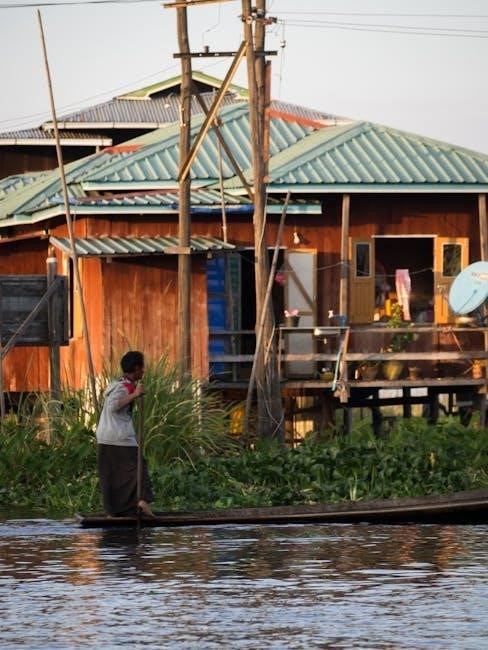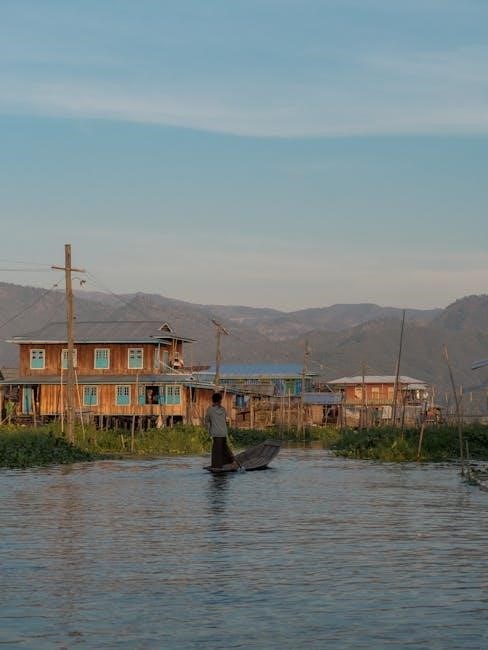Local governance in Myanmar is crucial for its democratic transition‚ with elected bodies now in place‚ yet challenges like limited decentralization and capacity persist‚ shaping its development trajectory.
1.1 Overview of Local Governance in Myanmar
Local governance in Myanmar operates within a centralized framework‚ with elected bodies at the township and village levels. Despite reforms‚ administrative decentralization remains limited‚ impacting service delivery. The General Administration Department (GAD) plays a key role in oversight‚ while civil society and international organizations support capacity building. Ethnic regions face unique challenges‚ with governance often influenced by armed groups. Efforts to enhance public participation and digital platforms like the iWomen app aim to improve inclusivity and efficiency in local governance structures.
1.2 Importance of Local Governance in Myanmar’s Development
Effective local governance is vital for Myanmar’s development‚ fostering democracy‚ accountability‚ and inclusive growth. It ensures delivery of essential services‚ promotes public participation‚ and strengthens community engagement. Local institutions play a crucial role in addressing regional disparities and ethnic inclusivity. Despite challenges‚ decentralization efforts aim to empower local leaders‚ enhancing responsiveness to grassroots needs. Strong local governance is essential for Myanmar’s transition to a stable‚ prosperous‚ and equitable society‚ aligning with national development goals and international support initiatives.

Historical Context of Local Governance in Myanmar
Myanmar’s local governance has evolved from pre-colonial kingdoms through British colonial rule‚ post-independence centralization‚ and the 2008 Constitution’s decentralized framework.
2.1 Pre-Colonial and Colonial Era Governance Structures
Pre-colonial Myanmar featured decentralized governance with local chiefs and village headmen managing communities. The colonial period introduced centralized British administration‚ undermining traditional systems. Post-independence‚ Myanmar reverted to a centralized model.

2.2 Post-Independence Governance Framework
After independence‚ Myanmar adopted a centralized governance framework‚ with limited autonomy for local institutions. The 2008 Constitution reinforced this structure‚ placing significant authority under the General Administration Department (GAD). Local governance remained tightly controlled‚ with minimal decentralization‚ stifling local decision-making and service delivery. This centralized approach persisted‚ despite growing demands for reform‚ highlighting the need for structural changes to empower local governments and enhance community participation in governance processes.
2.3 Impact of the 2008 Constitution on Local Governance
The 2008 Constitution introduced a framework that centralized authority‚ limiting local governance autonomy. While it established state and region governments‚ decision-making power remained concentrated at the Union level. Local institutions‚ such as the General Administration Department (GAD)‚ were reinforced but operated under strict central control. This structure hindered effective decentralization‚ affecting service delivery and public participation. Despite provisions for local governance‚ the Constitution perpetuated a top-down approach‚ constraining the potential for meaningful local autonomy and inclusive development.

Current Structure of Local Governance in Myanmar
Myanmar’s local governance operates through a hierarchical system‚ with the General Administration Department (GAD) overseeing administrative functions. Township and village-level structures manage local services‚ while fiscal decentralization remains limited.

3.1 Role of the General Administration Department (GAD)
The General Administration Department (GAD)‚ under Myanmar’s Ministry of Home Affairs‚ plays a central role in local governance by overseeing administrative processes. It manages staffing‚ budget allocation‚ and policy implementation at the local level. GAD coordinates with other government institutions to ensure alignment with national priorities. Key functions include supporting local councils‚ maintaining law and order‚ and facilitating public service delivery. Despite its critical role‚ challenges such as centralized decision-making and limited resources hinder its effectiveness in empowering local governments fully.

3.2 Township and Village-Level Governance Mechanisms
Township and village-level governance in Myanmar operates through elected bodies responsible for local service delivery and decision-making. These mechanisms aim to address community needs‚ manage resources‚ and implement policies. Local councils‚ supported by administrative staff‚ interact with higher authorities to align with national priorities. Despite their potential‚ challenges such as limited resources‚ centralized decision-making‚ and capacity gaps hinder their effectiveness. Strengthening these mechanisms is essential for improving grassroots governance and ensuring inclusive development across Myanmar’s diverse regions.
3.3 Administrative and Fiscal Decentralization
Administrative and fiscal decentralization in Myanmar remains limited‚ with significant central control over local governance. Despite the 2008 Constitution’s provisions for decentralization‚ decision-making authority and resource allocation are concentrated at the Union level. Local governments face challenges in generating revenue and implementing projects independently. Fiscal decentralization efforts are hampered by weak institutional capacities and inadequate funding mechanisms. Enhancing decentralization is critical to empower local governments‚ improve service delivery‚ and promote equitable development across Myanmar’s regions.

Key Challenges in Local Governance
Myanmar’s local governance faces challenges like centralized authority‚ limited decentralization‚ weak institutional capacities‚ and inefficient service delivery‚ exacerbated by conflicts and inadequate public participation mechanisms.
4.1 Limited Administrative Decentralization
Myanmar’s local governance is hindered by a highly centralized system‚ with limited administrative decentralization. Despite the 2008 Constitution’s decentralization provisions‚ power remains concentrated at the union level. Local governments lack autonomy in decision-making and resource allocation‚ undermining their effectiveness. The General Administration Department (GAD) maintains tight control over local affairs‚ restricting the ability of local institutions to respond to community needs. This centralized structure perpetuates inefficiencies in service delivery and public participation‚ further exacerbating governance challenges at the local level.
4.2 Capacity Building Needs for Local Officials
Local officials in Myanmar face significant capacity building needs‚ hindering effective governance. Limited training and resources impede their ability to manage administrative tasks‚ deliver public services‚ and engage with communities. Weak institutional capacities at the local level constrain coordination between agencies and the implementation of policies. Addressing these gaps requires targeted training programs‚ improved resource allocation‚ and support from organizations like UNDP and The Asia Foundation‚ which have initiated efforts to enhance local governance capacities and promote sustainable development.
4.3 Challenges in Service Delivery and Public Participation
Myanmar’s local governance faces challenges in delivering basic services like healthcare‚ education‚ and water supply‚ with significant disparities across regions. Public participation remains limited due to weak institutional frameworks and lack of awareness. Engagement mechanisms are underdeveloped‚ and citizens often feel disconnected from decision-making processes. These issues exacerbate inequality and undermine trust in local authorities‚ necessitating reforms to improve service accessibility and inclusivity‚ and strengthen participatory mechanisms to ensure equitable development and accountability.

Role of Civil Society in Local Governance
Civil society plays a vital role in Myanmar’s local governance by supporting community development‚ fostering public participation‚ and advocating for inclusive policies through NGOs and grassroots initiatives.
5.1 Contribution of NGOs and Community Organizations
NGOs and community organizations play a pivotal role in strengthening local governance in Myanmar by providing essential services‚ fostering community engagement‚ and advocating for inclusive policies. Organizations like UNDP and The Asia Foundation collaborate with local governments to enhance capacity and promote participatory decision-making. Grassroots movements empower citizens‚ ensuring their voices are heard in governance processes. These efforts address gaps in service delivery and promote equitable development‚ particularly in ethnic regions‚ thereby contributing to the country’s democratic transition and sustainable growth.
5.2 UNDP and The Asia Foundation’s Initiatives
UNDP’s local governance program in Myanmar focuses on strengthening institutional capacities and improving public service delivery. The Asia Foundation has published extensive research and reports on subnational governance‚ fostering dialogue and informing policy reforms. Together‚ these initiatives enhance local government effectiveness‚ promote participatory decision-making‚ and support inclusive development. Their collaborative efforts with local stakeholders aim to address governance challenges and empower communities‚ ensuring sustainable and equitable progress across Myanmar’s diverse regions.
5.3 Grassroots Movements and Citizen Engagement
Grassroots movements in Myanmar are driving citizen engagement in local governance‚ fostering inclusivity and transparency. Initiatives like the iWomen app aim to inspire rural women’s leadership‚ promoting gender equality in decision-making. These efforts empower communities to participate actively in governance‚ ensuring their voices are heard. By leveraging technology and community-driven solutions‚ grassroots movements are reshaping local governance‚ enhancing accountability‚ and building trust between citizens and authorities‚ ultimately strengthening Myanmar’s democratic framework and promoting sustainable development at the local level.
Local Governance in Ethnic Areas
Local governance in Myanmar’s ethnic areas faces unique challenges‚ with diverse structures in non-Bamar regions and the influence of armed groups shaping governance dynamics and inclusivity.
6.1 Governance Structures in Non-Bamar Ethnic Regions
Governance structures in non-Bamar ethnic regions of Myanmar vary significantly‚ shaped by historical legacies of colonial rule and military governance. These regions often operate under customary laws and traditional leadership systems‚ with limited integration into the formal state apparatus. The influence of armed groups and ethnic organizations further complicates governance‚ creating parallel administrative systems. Despite the 2008 Constitution’s provisions for decentralization‚ ethnic regions remain largely excluded from meaningful autonomy‚ leading to persistent tensions and demands for self-determination. Civil society and international organizations are increasingly engaging to address these disparities.
6.2 Role of Armed Groups in Local Governance
Armed groups play a significant role in local governance in ethnic regions of Myanmar‚ often establishing parallel administrative structures. Groups like the Arakan Army (AA) and others collect taxes‚ provide basic services‚ and enforce laws in areas under their control. This dual governance system challenges the central government’s authority‚ with armed groups sometimes gaining local support by addressing community needs. Their involvement in governance underscores the complex interplay between security and development in Myanmar’s conflict-affected regions.
6.3 Challenges in Ensuring Inclusive Governance
Ensuring inclusive governance in Myanmar’s ethnic areas remains fraught with challenges‚ including centralized power structures under the 2008 Constitution‚ which limits local autonomy. Ethnic and religious tensions often lead to exclusion and violence‚ marginalizing minority groups. Resource allocation and service delivery disparities further exacerbate inequalities. Additionally‚ the influence of armed groups and conflicting governance systems complicate efforts to create unified‚ inclusive policies. Addressing these issues requires systemic reforms and international support to foster equitable representation and participation across all communities.
Economic Governance at the Local Level
Economic governance at the local level in Myanmar involves decentralization of authority‚ private sector collaboration‚ and initiatives to boost local development‚ supported by UNDP and The Asia Foundation.
7.1 Decentralization of Economic Authority
The decentralization of economic authority in Myanmar aims to empower local governments to manage resources and make decisions tailored to regional needs. While the 2008 Constitution introduced steps toward decentralization‚ challenges remain‚ including limited fiscal autonomy and weak institutional capacity. Local authorities often struggle with insufficient funding and lack the power to implement economic policies effectively. Efforts by organizations like UNDP and The Asia Foundation focus on strengthening decentralization processes to enhance local economic governance and promote sustainable development.
7.2 Local Economic Development Initiatives
Local economic development initiatives in Myanmar focus on empowering communities through grassroots programs. Organizations like UNDP and The Asia Foundation support projects enhancing local economies‚ often targeting rural areas. The iWomen app inspires leadership among rural women‚ fostering gender equality. These initiatives encourage participatory decision-making and improve resource access‚ enabling local governments to address regional needs effectively and sustainably‚ thereby promoting inclusive growth.
7.3 Role of the Private Sector in Local Governance
The private sector plays a significant role in fostering economic growth and development at the local level in Myanmar. Collaborations between private enterprises and organizations like UNDP and The Asia Foundation have supported local projects‚ creating jobs and transferring skills. Public-Private Partnerships (PPPs) are increasingly recognized as vital for improving service delivery and infrastructure. While progress has been made‚ challenges such as regulatory barriers and limited access to finance hinder the private sector’s full potential in governance.
Technology and Innovation in Local Governance
Innovative technologies like the iWomen app and digital platforms are enhancing citizen engagement and women’s participation in Myanmar’s local governance‚ fostering inclusivity and efficiency.
8.1 Use of Digital Platforms for Citizen Engagement
Digital platforms are transforming citizen engagement in Myanmar’s local governance‚ enabling real-time feedback and participation. The iWomen app‚ designed to inspire rural women’s leadership‚ exemplifies this shift. Online portals now allow citizens to report service issues and participate in budgeting processes. These tools enhance transparency and inclusivity‚ particularly in urban areas. However‚ challenges remain‚ including limited internet access in rural regions and digital literacy gaps. Despite these hurdles‚ technology is fostering a more connected and participatory governance ecosystem‚ empowering citizens to influence local decisions effectively.
8.2 iWomen App for Women’s Participation

The iWomen app‚ developed to empower rural women‚ aims to boost their participation in local governance. By providing leadership training and networking opportunities‚ it addresses gender disparities in decision-making roles. Created by Myanmar’s programmers in collaboration with women’s groups‚ the app inspires leadership and civic engagement. While it has shown success in some regions‚ challenges like internet access and digital literacy in rural areas hinder its broader impact‚ emphasizing the need for complementary initiatives to ensure inclusivity and effectiveness in fostering women’s leadership.
8.3 E-Governance Initiatives in Myanmar
Myanmar has introduced several e-governance initiatives to enhance transparency and efficiency in local governance. These include digital platforms for public services‚ online portals for citizen engagement‚ and mobile apps like iWomen. UNDP has supported such efforts‚ aiming to bridge the gap between citizens and authorities. Despite progress‚ challenges like limited internet access and digital literacy hinder widespread adoption. However‚ these initiatives represent a significant step toward modernizing governance and fostering inclusivity in Myanmar’s development journey.
Future Strategies for Improving Local Governance
Strengthening decentralization reforms‚ enhancing public-private partnerships‚ and building capacity for local leaders are key strategies to improve governance‚ ensuring effective service delivery and inclusive development in Myanmar.
9.1 Strengthening Decentralization Reforms
Strengthening decentralization reforms is essential for effective local governance in Myanmar. This involves transferring decision-making authority and resources from central to local levels‚ ensuring accountability and inclusivity. Current centralized structures limit local autonomy‚ hindering service delivery and development. Reforms should focus on empowering subnational institutions‚ enhancing fiscal decentralization‚ and improving public participation. International partners‚ like UNDP and The Asia Foundation‚ are supporting these efforts through capacity-building initiatives. Successful decentralization will enable local governments to address community needs effectively‚ fostering equitable development and stability across Myanmar.
9.2 Enhancing Public-Private Partnerships
Enhancing public-private partnerships (PPPs) is vital for improving local governance in Myanmar. These collaborations can mobilize private sector resources and expertise to address local development challenges. USAID and UNDP programs have supported such initiatives‚ fostering innovation and inclusive growth. Strengthening PPPs requires clear policy frameworks and stakeholder engagement to ensure accountability and sustainability. By leveraging private investments‚ local governments can enhance service delivery and infrastructure‚ driving economic growth and improving livelihoods. Effective PPPs will be instrumental in achieving Myanmar’s long-term development goals and ensuring equitable progress across regions.
9.3 Building Capacity for Local Leaders
Building capacity for local leaders is essential for effective governance in Myanmar. UNDP and The Asia Foundation have initiated programs to enhance leadership skills and governance capabilities at the local level. These efforts focus on strengthening institutional capacities‚ improving decision-making processes‚ and fostering accountability. Local leaders face challenges such as limited resources and centralized decision-making‚ making capacity building critical for addressing these issues. By empowering local leaders‚ Myanmar can ensure more responsive and inclusive governance‚ ultimately driving sustainable development and improving public services across regions.
International Community’s Role in Supporting Local Governance
The international community plays a vital role in supporting Myanmar’s local governance through funding‚ technical assistance‚ and capacity-building programs‚ enhancing decentralization and inclusive development efforts nationwide.
10.1 USAID and UNDP Programs
USAID and UNDP have been instrumental in supporting Myanmar’s local governance through targeted programs. USAID focuses on strengthening local institutions to improve public service delivery and promote good governance. UNDP‚ in collaboration with Myanmar’s General Administration Department (GAD)‚ has developed state and region-specific reports to enhance decentralization and capacity building. These initiatives aim to foster inclusive and accountable governance‚ addressing critical challenges and empowering local communities. Their efforts have significantly contributed to Myanmar’s decentralization reforms and grassroots development‚ laying a foundation for sustainable progress.
10.2 The Asia Foundation’s Research and Advocacy
The Asia Foundation has played a pivotal role in advancing local governance in Myanmar through comprehensive research and advocacy. Their publications‚ such as the “State and Region Governments in Myanmar” report‚ have provided critical insights into subnational governance structures. By collaborating with local organizations‚ they have supported policy reforms and informed international aid strategies. The Foundation’s work emphasizes decentralization‚ public participation‚ and gender equality‚ fostering a more inclusive and accountable governance framework. Their efforts have significantly influenced Myanmar’s governance landscape‚ promoting sustainable development and peacebuilding initiatives at the local level.
10.3 Challenges in International Aid Coordination
International aid coordination for local governance in Myanmar faces significant challenges‚ including conflicting donor priorities and alignment with local needs. Bureaucratic inefficiencies and limited capacity within Myanmar’s institutions hinder effective implementation. Political instability‚ particularly after the 2021 coup‚ has further complicated aid delivery‚ with restricted access to conflict zones. Additionally‚ ensuring transparency and accountability in aid distribution remains a pressing issue‚ requiring enhanced collaboration between international partners and local stakeholders to address these systemic challenges effectively.

Lessons Learned and Best Practices
Myanmar’s local governance progress highlights the importance of inclusive decision-making and community participation. Successful decentralization models and UNDP initiatives demonstrate effective strategies for improving governance and service delivery.
11.1 Successful Decentralization Models
Myanmar’s decentralization efforts have shown progress through UNDP and The Asia Foundation’s initiatives‚ emphasizing inclusive decision-making and community participation. Local media networks in ethnic regions‚ supported by UNDP‚ have enhanced transparency and public engagement. Decentralization models focusing on devolving administrative and fiscal powers to local governments have improved service delivery and accountability. These strategies highlight the importance of balancing centralized oversight with grassroots empowerment‚ fostering trust and collaboration between local authorities and citizens. Despite challenges‚ such models offer valuable lessons for sustainable governance reforms in Myanmar.
11.2 Case Studies of Effective Local Governance
Effective local governance in Myanmar is exemplified by UNDP’s initiatives‚ which have strengthened local media networks in Chin‚ Shan‚ and ethnic regions‚ enhancing transparency. The iWomen app‚ designed to inspire rural women’s leadership‚ demonstrates innovative approaches to gender inclusion. Local economic development projects‚ supported by The Asia Foundation‚ have empowered communities through participatory decision-making. These case studies highlight the potential of grassroots initiatives to improve service delivery‚ fostering trust and collaboration between citizens and local authorities‚ and providing replicable models for inclusive governance across Myanmar.
11.3 Key Recommendations for Policy Makers
Policymakers should prioritize decentralization reforms‚ empowering local governments to improve service delivery and public participation. Strengthening the capacity of local officials through training and resources is essential. Gender-inclusive policies‚ such as the iWomen app‚ should be scaled to enhance women’s leadership. Leveraging technology for e-governance and citizen engagement can foster transparency. Encouraging public-private partnerships and inclusive decision-making processes will ensure equitable development. Addressing ethnic disparities and fostering peace in non-Bamar regions are critical for sustainable governance.
Myanmar’s transition toward democratic governance requires sustained reforms‚ emphasizing decentralization‚ capacity building‚ and inclusive policies to address ethnic disparities and ensure equitable development for a stable future.
12.1 Summary of Key Findings
Local governance in Myanmar has evolved significantly‚ with elected bodies now in place‚ yet challenges persist‚ including limited administrative decentralization and capacity gaps. Civil society‚ notably UNDP and The Asia Foundation‚ has played a pivotal role in strengthening governance frameworks. Ethnic regions face unique obstacles‚ with armed groups influencing local structures and inclusive governance remaining elusive. Service delivery and public participation continue to be hindered by systemic issues‚ underscoring the need for reforms to ensure equitable development and stability across Myanmar’s diverse regions.
12.2 The Way Forward for Local Governance in Myanmar
The path forward for Myanmar’s local governance involves strengthening decentralization reforms‚ enhancing public-private partnerships‚ and building capacities for local leaders. Leveraging technology‚ such as digital platforms and initiatives like the iWomen app‚ can improve participation and service delivery. International support from organizations like USAID and UNDP remains critical to provide resources and expertise. By addressing these areas‚ Myanmar can foster inclusive‚ responsive‚ and effective governance‚ ultimately advancing its democratic and developmental aspirations.
